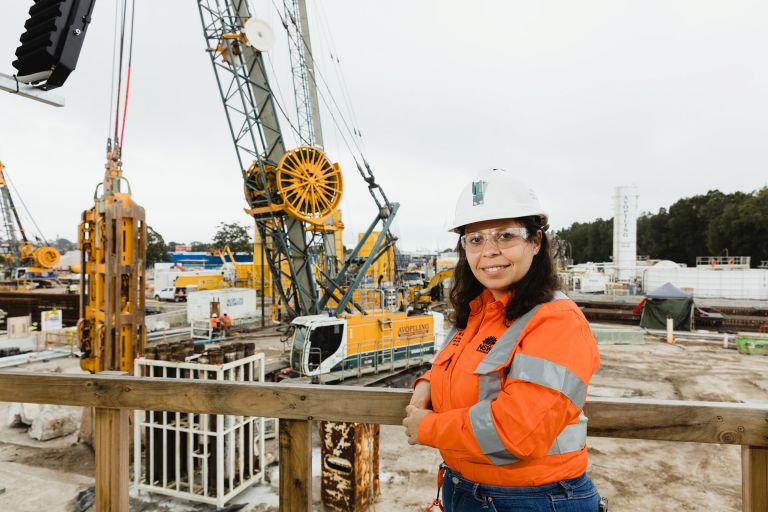About Nagham
- Qualifications
- Favourite school subjects?
- First full-time job?
- What sparked your interest in a construction career?
I have a Bachelor of Civil Engineering (Structural) and a Masters of Project Management.
Math and physics.
My first full-time job was as an undergraduate engineer with a building and structures engineering firm. It was a part of my last year at uni. I got to witness and experience everything on-site, ensuring I had the theoretical knowledge and practical experience through my degree before I finished.
My high school interest in Maths and Physics exposed me to algebra, drawing, and measurement. I used to walk around my neighbourhood and gaze at the construction sites, I wanted a career that combined theory with something very practical.
When I looked at more buildings, bridges, and other structures, the construction part of each one interested me, and I knew this was what I wanted to do.
"The construction industry has so much on offer –many different projects of all different types and sizes." - Nagham on the construction industry.
Can you tell me about your current job?
I’m a Project Engineer on a delivery team. This job is a unique experience for me because of the various structures, the tunnelling environment and the project's technical challenges.
On a typical day I catch public transport to get to work checking my emails, daily tasks and calendar on the way and plan what I need to do.
If I’m working on-site, I attend the project pre-start and toolbox meeting with the contractor and chat with the site team about the work for the day. If there is an urgent issue or an action, I get onto that immediately. I need to be available to resolve any issues that come up.
Then, I do daily site walks and inspections with the contractor to check progress and that safety measures are in place. I work closely with the contractor to resolve technical issues when they come up and overcome the project’s technical challenges.
We keep the community up to date on the latest project developments. I’ll get involved by explaining what is happening, and sometimes that means knocking on the doors of residents and businesses to make sure they know what is going on.
I like to start my day early, so I try to get to the site office early if I’m based on-site so I can attend the pre-start meeting when required or I go to the office as required. My finish time varies but generally I try to leave any time after 4:30pm.
The best part of my job is getting the project finished and seeing the community use it. There’s so much pride in that!
There are two big ones. First, ensuring that the site paths (sequence of activities needed to complete the project) and the project overall are completed to the quality standards, ensuring we leave a good legacy to the community. The other equally important one is safety – we don’t want any injuries anywhere, anytime. Everyone working on the project deserves to go home safely every day.
Problem-solving, people and stakeholder management skills are required. In addition, it helps if you are a skilled communicator.
"You must build good relationships and work as one team regardless of which side you are on. There is no win-lose in construction. We must all be winners!" - Nagham on teamwork on site.
What’s been your career pathway?
I’m from Syria and came to Australia via Lebanon just before Christmas 2016.
I studied Civil Engineering in Syria and worked in structural design and project management. I worked on the structural design of multistorey residential, industrial and commercial buildings. Then I decided to move to the delivery aspect so I joined a building contractor as a site engineer in residential building projects.
Despite working hard to establish my successful career, I had to flee to Lebanon to escape the war in Syria. I escaped with my family leaving everything behind.
Having to start my career again was frustrating.
I needed local experience in Australia to start applying for jobs in my profession. I volunteered with Bankstown Council and worked in building maintenance. Then, I joined TfNSW through a cadetship program for six months and after that, I joined TfNSW, Easing Sydney Congestion, pinch point program. As a project engineer, I delivered various intersection upgrades across Sydney.
I have two mentors. I learned a lot from my first manager here in Australia, and I still seek professional advice from time to time. I have a mentor in my current workplace who I talk with about my career and professional development.
I think I’m working on it right now! The chance to work on a mega-project like the M6 Stage 1 doesn’t come around often. The project's scale, complexity and tunnelling works make it an inspiring one to work on.
Image

What do good construction employers do?
- Inspiring leadership
- Great team culture
- Quality projects
What’s next careerwise?
My plan is to become a construction manager.
There are many options – talk, search, approach – take the first step and go from there.
Ask your local council, a big-tier contractor or a small construction company if they offer placements.
If you hire someone, hire for their attitude, not so much for their skills. I like this one because you can learn new skills, but the attitude is much harder to change.
